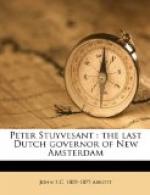“was of no avail. The country was the king’s, the people his subjects. When priority of title from the Indians was invoked, those from whom the Dutch purchased were, it was replied, not the right owners and had no right to sell. But when deeds which the English held from natives, happened to be older than those of their opponents, then the title could not be gainsayed. All must be received without contradiction.
“The truth is, the Directors in Holland were mistaken in their reliance upon Winthrop’s friendship. He now manifested the greatest hostility to the Dutch, and was the head and front of all the opposition they experienced. He was no doubt well-advised of the designs of the Duke of York, and of his brother the king of England, which were about to develop themselves against this province.”
While New Netherland was thus fearfully menaced by England, the internal affairs of the province were in a state of prosperity. The rich soil was producing abundant harvests and farms were extending in all directions. Emigrants were continually arriving and were delighted with their new homes. The population of the province now amounted to full ten thousand. New Amsterdam was a flourishing city, containing fifteen hundred inhabitants.
This prosperity excited both the jealousy and the covetousness of the British court. The king resolved, by one bold blow, to rob Holland of all her American possessions. On the 12th of March, 1664, the king of England granted to his brother James, the Duke of York, the whole of Long Island, all the islands in its neighborhood, and all the lands and rivers from the west side of Connecticut river to the east side of Delaware Bay. This sweeping grant included the whole of New Netherland. This was emphatically expelling the Dutch from the New World.
The first intimation Governor Stuyvesant received of this alarming movement came to him from Boston. A young man, named Ford, brought the tidings to New Amsterdam that a fleet of armed ships had sailed from the naval depot in Portsmouth, England, to enter the Hudson river and take possession of the whole territory. This intelligence created not a little panic. The governor summoned his council, and it was decided to exert every energy in fortifying the city. The hostile fleet might make its appearance any day.
Money was raised. Powder was ordered from the forts on the Delaware. Agents were sent to New Haven to purchase provisions. As it was expected that the fleet would come through the Sound, agents were stationed along the shore, to transmit the tidings of its approach, so soon as the sails should be seen in the distant horizon. Several vessels on the point of sailing with supplies to Curacoa were detained.
So secretly had the British government moved in this enterprise, that the governmental authorities, in Holland, had not the slightest suspicion of the peril to which their colony in New Netherland was exposed. At the moment when all was agitation in New Amsterdam, and every hand was busy preparing for the defence, Governor Stuyvesant received dispatches from Holland, assuring him that no apprehension of danger from England need be entertained.




